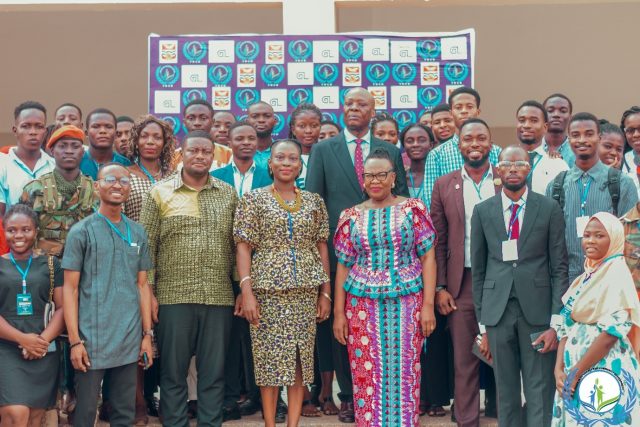On Friday, February 24, 2023, I travelled to the Central Regional Capital of Cape Coast to participate in a conference which sought to explore opportunities for young people and careers for students in the areas of Diplomacy and International Relations.
The Diplomatic Convocation 2023 was hosted by the Student Representative Council (SRC) of the university in partnership with the Youth in Diplomacy and Community Development under the theme: ‘Empowering the Youth to Build Career in Diplomacy and International Relations’.
Held at the New Examination Centre at the University of Cape Coast, the special guests at the event included the Namibian High Commissioner to Ghana, Her Excellency Selma Ashipala- Musavyi and Ambassador of Peru to Ghana, His Excellency Abel Antonio Cardenas Tuppia.
Dr. (Mrs.) Mavis Serwah Benneh Mensah, Founding Director of the Centre for Entrepreneurship and Small Enterprise Development (CESED), School of Business – University of Cape Coast, represented the Vice Chancellor and Pro-Vice Chancellor of the university.
The concept of diplomacy was explained to the attendees, which comprises spoken or written communication by representatives of states intended to influence events in the international system. It became known that diplomacy is the main instrument of foreign policy, which represents the broader goals and strategies that guide a state’s interactions with the rest of the world.
On the other hand, international relations is the interactions between sovereign states, and the scientific study of those interactions is called international studies or international affairs. International relations also focuses on the relations of states with international organisations and certain sub-national entities, such as political parties and interest groups. It is also related to a number of other academic disciplines, including political science, geography, history, economics, law, sociology, psychology and philosophy.
During the event, Ghanaian youths, particularly women, were urged to expand their knowledge and understanding of current world order from a historical perspective. They were also charged to be abreast with global happenings and explore innovative ways to resolve situations they are faced with.
Contributing to the event, I reiterated the fact that young people do not only represent the future of our country and the world at large, but are one of society’s main agents of change and progress. For that reason, the youths have a great effect on economic development as well.
“In this stage of our lives, we build many social relationships and develop a personality that defines us as a new generation. This generation will solve future crises, lead countries, write policies, innovate and preserve or destroy democracies and systems of justice. And it is important to have women making great strides in this regard,” I added.
The speakers highlighted the importance of international relations, which allows nations to cooperate with one another, pool resources, and share information as a way to face global issues that go beyond any particular country or region and contemporary global issues – such as pandemics, terrorism and the environment.
They further engaged the attendees on prospective career choices within the field of Diplomacy and International Relations. “It is important to become part of a diverse international community of students and academics. In addition to becoming diplomats, you can develop a career in an international organisation, such as the United Nations, World Health Organisation, International Monetary Fund, World Bank and other foreign offices,” His Excellency Abel Antonio Cardenas Tuppia mentioned.
Youth in Diplomacy and Community Development (YDCD) is a youth-led non-governmental organisation (NGO) committed to social transformative programmes that seek to prepare young people for global assignments while driving social change and community development.
YDCD equips young people with the knowledge, skills and ethics needed to succeed in this area. As an efficient preparatory platform, YDCD ensures continuous learning through diplomatic convocations, professional discourse, and practical community engagements involving rigorous leadership, mentorship, and empowerment.


















